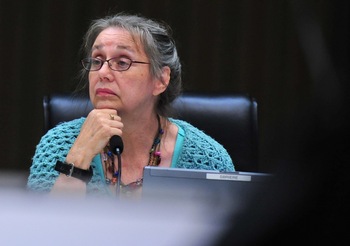Ann Arbor sets medical marijuana regulations - and line for dispensary license starts already

Ann Arbor resident James Brinker, an associate of a proposed medical marijuana dispensary on Packard Road, camps outside of city hall Monday night in order to be the first in line to get one of a limited number of dispensary licenses. City officials, however, say they have no intention of making people camp out to get licenses, and a formal application process is still months away.
Ryan J. Stanton | AnnArbor.com
Gould, who hopes to open a dispensary on Packard Road just east of Platt, had an associate camp outside city hall Monday night to ensure he gets one of a limited number of licenses the city plans to hand out allowing marijuana businesses to operate in the city.
"We're prepared to stay there as long as necessary to ensure that we are first in line to turn in our application," Gould said. "Ultimately, we would like to see the city issue numbers to avoid having to camp out for such a long period, but we are prepared to camp as long as necessary if the city is not willing to issue us a number. We want to be No. 1 in line."

Council Member Sabra Briere, D-1st Ward, brought forward a series of minor amendments to the city's medical marijuana regulations Monday night, including eliminating a requirement that dispensaries include the dollar amount of medical marijuana products on package labels.
Ryan J. Stanton | AnnArbor.com
The council also voted to approve a zoning ordinance that spells out where medical marijuana operations can be located in Ann Arbor.
The city has had a moratorium prohibiting new dispensaries from opening in Ann Arbor since last August, but city officials estimate there still are about 15 to 18 operating in the city.
The council took action Monday night to extend the moratorium for 120 days, which will last through the end of October. So even though the ordinances will take effect in 60 days, there still will be a lengthy window of time before any new dispensaries — Gould's included — could open.
Operations that were up and running prior to the moratorium last August have up to 60 days after the ordinance takes effect to submit an application for a license. No other applications are going to be accepted until 75 days after the ordinance takes effect.
The licensing ordinance caps the licenses to be issued at a number 10 percent higher than the licenses applied for in the first 60 days, but not more than 20. So, if there really are 15 to 18 dispensaries already operating in Ann Arbor, and all of them seek licenses, no more than two additional licenses would be available to new dispensaries.
"It sounds like there are going to be one or two of them offered, and hopefully we'll get one of them," said Gould, who has plans for a dispensary called Arborside Health and Wellness. He's been waiting months for the City Council to finish work on the ordinances and, in the meantime, has been paying rent for a future storefront operation at 3150 Packard Road.
City Attorney Stephen Postema said he wouldn't recommend anybody camp outside of city hall to get a license. He said it'll be up to a new medical marijuana licensing board to determine the process for applying for dispensary licenses in Ann Arbor.
"The board would have to make a determination on that and it's not clear what they will do," Postema said. "Being first in line may not ensure a license."
Council members were relieved to have work on the ordinances, for the most part, behind them Monday night. They've been working on them for months with constant input from the medical marijuana community.

Stephen Postema
Postema said the Michigan Court of Appeals is expected to rule soon on a case out of Isabella County that could have broad implications for marijuana dispensaries in Michigan.
Isabella County Trial Court Judge Paul Chamberlain ruled in December that patient-to-patient transfers and deliveries of medical marijuana fall "soundly within medical use" of marijuana as defined under the Michigan Medical Marijuana Act.
Oral arguments in the case — the state of Michigan vs. Compassionate Apothecary LLC of Mount Pleasant — were heard by the appeals court two weeks ago. Postema said he's expecting the court to take swift action, potentially overruling the trial court's decision.
"What's significant about a court of appeals issue is that — to the extent that it's published, and I believe it would be published — it would be binding on all the courts and would be the first time an appellate court would provide guidance on this," Postema said.
He said that would be sorely needed guidance for cities like Ann Arbor that have struggled to interpret the state law, which makes no mention of marijuana dispensaries. Meanwhile, marijuana remains an illegal controlled substance under federal law.
"Frankly, it's the guidance that municipalities need," Postema said of the anticipated appeals court ruling. "Everybody's waiting for this to come down."
Postema said a ruling that says patient-to-patient transfer of medical marijuana is illegal would be a game changer for many dispensaries in Ann Arbor that have adopted such a business model. He encouraged council members to hold off on passing the ordinances Monday night and to instead wait to see what the appeals court has to say first.
Mayor John Hieftje asked if the court could rule in such a way that dispensaries would be completely outlawed in Michigan. Postema said that's a possibility.
"To what extent they're also going to deal with other business constructs, we don't know," he said. "We don't know what they're going to say about dispensaries in general."
Council members ultimately decided they wanted to pass the ordinances Monday night and deal with having to tweak them later if they conflict with any court rulings. Council Member Carsten Hohnke, D-5th Ward, said he didn't see the harm in going that route.
"There's clearly some benefit to us moving forward," he said. "It provides some clarity and timeline and process and we've been at this for a while, and there are people who are depending on us coming to some kind of conclusion here."
Council Member Sandi Smith, D-1st Ward, agreed.

Sandi Smith
Hieftje, who favored postponing the issue for another month, appeared frustrated with Smith and others who wanted to pass the ordinances, though he ultimately voted for them.
"I would point out that anyone who has a medical marijuana card and wants to receive marijuana, there are dispensaries open," he noted.
The two voices of opposition to the ordinances Monday night were Council Members Marcia Higgins, D-4th Ward, and Stephen Rapundalo, D-2nd Ward.
Rapundalo called it "ridiculous" to have the city spending any more time and effort on coming up with its own ordinances when the issue is still playing out at the state level. He also said the ordinance language was "still insufficient" in terms of regulatory parameters needed.
"I certainly find the allowance of dispensaries to be problematic," he said, adding he didn't think dispensaries should be allowed at all in Ann Arbor.
Council Member Sabra Briere, D-1st Ward, brought forward a series of minor amendments Monday night, including eliminating a requirement that dispensaries include the dollar amount of medical marijuana products on package labels.
The zoning ordinance, as approved, states medical marijuana dispensaries and cultivation facilities can't be located within 1,000 feet of an elementary or secondary school.
Another rule is that no one under the age of 18 is allowed inside a medical marijuana dispensary or cultivation facility unless accompanied by a parent or guardian. Also, no smoking, inhalation or consumption of marijuana can take place on the premises.
Drive-in dispensaries are prohibited under the zoning ordinance, which also states all activities of a dispensary or cultivation facility must be conducted indoors.
Another rule states, "No equipment or process shall be used in any medical marijuana dispensary or medical marijuana cultivation facility which creates noise, dust, vibration, glare, fumes, odors or electrical interference detectable to the normal senses beyond the property boundary." Also, no more than 72 marijuana plants can be grown at a cultivation facility.
Dispensary owner Chuck Ream, one of the leading voices in the medical marijuana movement locally, told council members at the start of Monday's meeting he thought the licensing ordinance was "pretty well done" but the zoning ordinance still was in "very bad shape."
Ryan J. Stanton covers government and politics for AnnArbor.com. Reach him at ryanstanton@annarbor.com or 734-623-2529. You also can follow him on Twitter or subscribe to AnnArbor.com's e-mail newsletters.


Comments
How To
Sun, Jun 26, 2011 : 5:23 a.m.
Within minutes of the passage of Ann Arbor's new medical marijuana regulations, cannabis entrepreneur Rhory Gould already was claiming his spot in line. I admire this guys determination to open a marijuana dispensary. The council set the rules and he is following them. These medical marijuana dispensary licenses are very competitive, especially if only an additional 2 are going to be issued. Everyone and their mother wants to open a dispensary. So if you are planning to get in the dispensary business be prepared to go to these types of extremes. I hope Mr. Gould does open his marijuana dispensary, as every dispensary is another blow to the failed drug war! I wrote a book to help people get in the dispensary business, check it out: <a href="http://www.How-To-Open-A-Dispensary.com" rel='nofollow'>http://www.How-To-Open-A-Dispensary.com</a>
treetowncartel
Wed, Jun 22, 2011 : 1:50 p.m.
Yesterday, A Judge somehere in the State declared the Act Unconstitutional and pre-empted by federal law. the case will surely make its way to the State Supreme court if it is pursued. To bad that overwhelming majority of voters who supported the Act didn't use their overwhelming majority of votes to get rid of the Judges on the bench who will most likely uphold this decision.
debling
Tue, Jun 21, 2011 : 3:30 p.m.
All this waste of time and effort when we could do the right thing and legalize the darn stuff. Liberalism = Liberty = Freedom Conservatism = Controls = Rules
Peter Jameson
Tue, Jun 21, 2011 : 2:56 p.m.
Steve, Is marijuana legislation in the constitution? I believe that it is the state's right to legislate on the issue. Our government has done plenty of thing in our past that were unconstitutional, but it doesn't make these things right.
Belgium
Tue, Jun 21, 2011 : 4:54 p.m.
Just like the Feds regulate Tobacco as a vegetable instead of a drug? Because if they regulated it like a drug, it would be pulled from the shelves. Applying that same logic and due to the lack of a significant manufacturing and chemical additions, it makes even more sense for marijuana to be regulated as a vegetable. In which case, it never should have been illegal.
Steve Hendel
Tue, Jun 21, 2011 : 3:29 p.m.
No, marijuana is not referred to in the Constitution-but neither are many things which we deal with every day. The fact is that the federal government regulates drugs (FDA, DEA, etc.) just like it regulates a lot of other things. Would you even WANT the States to have the ability to legalize the sale of some REALLY dangerous drugs (say, crack and heroin) which were similarly ignored by the founding fathers?
Atticus F.
Tue, Jun 21, 2011 : 12:56 p.m.
Steven Handle, people are suffering now. "Wait for for the government to regulate it" seems like a simple solution, if you haven't made any consideration for people who are dying of cancer. But the reason the voters voted for this law is because people who are dying of cancer can't wait for the goverment to help them. The voters of our state took it upon themselves (via voter driven innitiative) to do something about it now.
Belgium
Tue, Jun 21, 2011 : 4:50 p.m.
Steve - if you've already made up your mind that the result of the legalization is that drug dealers are going to find new "victims" for their nefarious product, than you're truly living in the 1950s. Join us in 60 years and we'll talk.
Steve Hendel
Tue, Jun 21, 2011 : 1:16 p.m.
Yes, I know they are, but the fact id that local voters cannot override federal law however much they might want to; plus, it looks to me like a good number of the people who are trying to set up dispensaries are nothing more than drug dealers looking for new (and quasi-sanctioned) channels of distribution.
Jessica Arnold
Tue, Jun 21, 2011 : 12:39 p.m.
Am I not mistaken? But didnt the mayor suggest to the people that they not speak and encouraged them to go home because this was not going to be voted on? I believe I did. So whats this an example of ? and or is this another incorrect article jumping the gun ?
Atticus F.
Tue, Jun 21, 2011 : 12:58 p.m.
Coucil overrode the mayor's decision, and voted to pass the ordinance. It's called democracy.
Steve Hendel
Tue, Jun 21, 2011 : 11:18 a.m.
Federal law makes marijuana a controlled and largely banned substance, and the only reason the Council is even discussing these issues is that the federal government has decided, sort of, not to enforce the law in certain instances. I saw a 'help wanted' ad in Annarbor.com some time back looking for doctors who would work in dispensaries, writing Rxs for medical marijuana. It promised income of up to $2,500 PER DAY! Look at some of the people who want to open dispensaries, and look at their records, including past drug offenses. What are we doing here, putting the gloss of City regulation over, essentially, drug dealers? IF medical use of marijuana is a desirable goal, then the federal government needs to legalize, regulate and tax it. That would solve the problem.
Hmm
Tue, Jun 21, 2011 : 5:55 p.m.
Agreed the Federal government does need to get with the program and change their stance, however the people in charge of making that change (the DEA) have a purely profit driven vested interest in keeping it as schedule 1. Reform needs to begin in that one governmental agency first and foremost if anything is ever going to change on a national level.
Belgium
Tue, Jun 21, 2011 : 4:48 p.m.
Yes, but they are beholden to a variety of lobbys that oppose legalization, alcohol being just one of them. The reason the Council is discussing these issues is because the People of the Great State of Michigan voted to legalize Marijuana and now cities have to decide how to regulate the process. Mainly because the Feds are sitting on their hands.